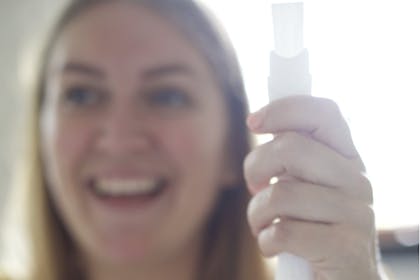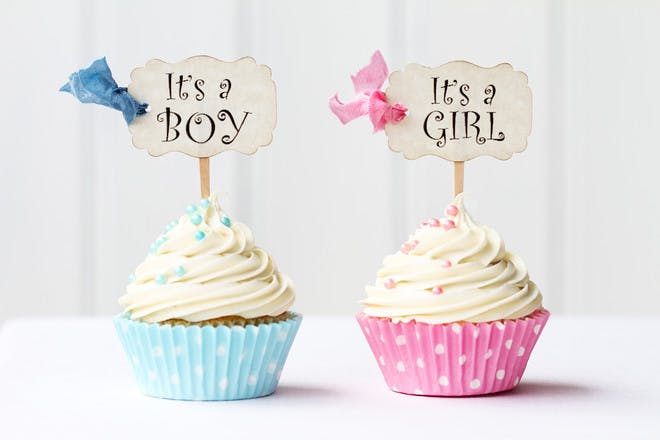How soon can you take a pregnancy test?

This page contains affiliate links, which means we may earn a small amount of money if a reader clicks through and makes a purchase. All our articles and reviews are written independently by the Netmums editorial team.
Whether you're actively trying for a baby, or think you might be pregnant, you'll be dying to take a pregnancy test to find out for sure. But how early on can you take one? And how do they actually work? Here's everything you need to know about pregnancy tests.
How soon can I use a pregnancy test?
As tempting as it can be to take a pregnancy test soon after you've had sex, there's little point in doing it too soon.
Pregnancy tests work by detecting the pregnancy hormone, hCG (human chorionic gonadotrophin) in your urine; test too soon and the levels won't be high enough to detect it. So, even if you are in the early stages of pregnancy, your pregnancy test will be negative.
It takes about six days after conception for your body to produce the pregnancy hormone, and then another few days after that for the level to be high enough to be recognised by a pregnancy test.
FREE NEWBORN NAPPIES
if you're trying to conceive (TTC), the disappointment of a negative test can be hard to bear, especially if you've been trying for a baby for a while.
So, to give you the best chance of getting a big fat positive (BFP) on the stick, it's recommended that you don't use a pregnancy test too early in your cycle.
When to take a pregnancy test
To get an accurate result you have two main choices:
- use an early detection pregnancy test that allows you to test as soon as four or five days before your period is due (see below for more about how these work).
- stick to NHS advice that says the most reliable time to test is any time from the first day of a missed period OR at least 21 days after having unprotected sex (if you don't know when your next period is due).
How do pregnancy tests work?
Pregnancy tests work by detecting the pregnancy hormone hCG in your urine. Based on that, you'll get either a positive result telling you that 'you're pregnant' or a negative test result, in other words telling you, 'you're not pregnant'.

Different tests show different results – some have words while others use lines to indicate whether you are pregnant or not. Some can even tell you how many weeks pregnant you are already, although these tend to be more expensive brands, such as Clearblue.
How to use a pregnancy test
Most tests simply require you to follow these three steps to get a result:
1. take the cap off the pregnancy test (if there is one)
2. sit on the toilet ready to do a wee
3. hold the stick down so that it's in the stream of your urine; yep, you literally wee on the stick!
There's no need for this to be your first wee of the day, either. You can do a pregnancy test on a sample of urine collected at any time of the day, although your morning wee is likely to have the highest concentration of hCG.
Some tests also come with a collection pot, so you can wee into the cup and then put the stick in there, rather than trying to wee on the stick. If the test doesn't have a pot, you can always pee in a cup and put the stick in there if you prefer; it shouldn't affect the results.
Can I still be pregnant after a negative pregnancy test?
While a positive test result is rarely wrong, a negative result is less reliable.
Often referred to as a 'false negative', the most common reason for getting a negative test result when you are in fact pregnant, is testing too soon.
Luckily, it's easy to find out if it is a false negative – just wait a few days and try another test.
Of course, it could also be negative because you aren't pregnant yet, so try not to be too disheartened if that's the case.
How do early pregnancy tests work?
Some very sensitive pregnancy tests can be used up to four or five days even before you miss a period, and from as early as eight days after conception. They are designed to be able to detect even tiny traces of hCG in your urine that regular pregnancy tests might not pick up.
Popular early pregnancy tests on the market include:
1. Clearblue Early Detection – claims to give results five days before your period is due. See more details here at Amazon.
2. First Response tests – gets results as early as five days sooner than the day your period is due. See more details here at Amazon.
Boots and Superdrug do their own early tests, too.
Remember that the earlier you do a test, the lower the chance of it detecting whether you're pregnant. If you do get a negative result with an early pregnancy test, you could still be pregnant.
You may even notice an implantation bleed or experience some common early signs of pregnancy in the very early weeks of pregnancy, too.
Where can I get a free pregnancy test?
The cost of buying pregnancy tests can soon add up, especially if it takes you longer than expected to conceive.
If you need help buying tests, it is possible to get free pregnancy tests from:
- community contraceptive clinics, such as your nearest sexual health clinic
- sexual health or genitourinary medicine (GUM) clinics
- some young people's services
- Brook centres – for under-25s
- Some GPs may be able to offer you one, too.
Alternatively, although pregnancy tests can cost as much as £13.99 per test, these pregnancy tests are all less than a fiver each.
Here's more on which pregnancy tests to buy.
Homemade pregnancy tests: do they work?
No. There are loads of rumours online suggesting that you can make a DIY pregnancy test using sugar, toothpaste, bleach, shampoo, vinegar or salt. Unfortunately, there's no evidence that homemade tests can give a reliable results
The only way to get an accurate and reliable result is by using a reputable brand of pregnancy test.
What does it mean if the test just shows a faint line?
A faint line on a pregnancy test can mean one of two things:
Evaporation line
Sometimes, as urine evaporates from the test, it can leave a faint line behind. You're more likely to notice this if you wait too long before checking the results after you've used the test.
It's too early
A faint line can also mean that you have low levels of hCG in your system, meaning you're pregnant, but it's still too early for the test to show it clearly.
The best thing to do if you see a faint line is to wait a few days and try again. You can also head to the pregnancy test group in our friendly forum to post the pic of your test and get a second opinion.
Can my GP confirm my pregnancy test results?
Because modern pregnancy tests are so accurate, GPs don't normally offer another test. If you tell your GP you're pregnant, they'll believe you! And if you say you're not pregnant, they may advise you to wait and test again.
It takes some couples a long time to conceive. The NHS quotes research that shows that, among couples having regular unprotected sex, the amount of time it takes to get pregnant can vary due to your age:
- Age 19-26: 92% will conceive after one year and 98% after two years
- Age 35-39: 82% of couples will conceive after one year and 90% after two years
So if you've waited until after your period is due, and a test is still negative, chances are you just haven't been lucky this cycle.
Your GP usually won't offer you any investigations for potential fertility problems until you've been trying without success for at least a year. However, you can ask to be referred to a fertility specialist sooner if you're a woman over 35, or if you or your partner have any known healthcare conditions that could affect your fertility.
Watch NHS midwife Caron talk about doing a pregnancy test in the video below ...
It's positive! What do I do now?
Other than having a sit down and a cup of herbal tea to calm your excitement – you're off the booze for nine months now, remember – just enjoy letting the news sink in.
If you're not sure whether you want to continue with your pregnancy, read about your options here.
You can decide how to spring the news on your other half, if they've not already seen the test and you can even try to work out your due date with our calculator below...
Then you should buy some folic acid tablets and book a GP appointment. Your GP will help work out your approximate due date and go through your hospital and birthing centre options.
Once you've decided, they'll refer you so that your midwife can get you booked in for antenatal appointments and scans, which will help give you the most accurate due date and get you ready for the trimesters ahead.
Find out more about what to do now you're pregnant, here.
Still too early to test? Get tips for the two-week wait (TWW) below. Or if the test was positive, get your pregnancy off to a great start by joining your due date club in our forum, or checking out the foods to avoid now you're pregnant:





